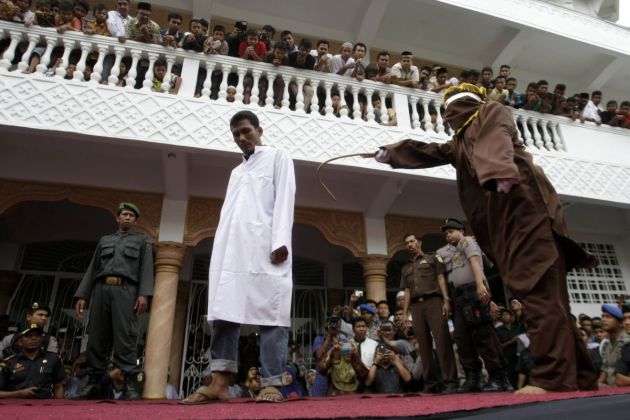Indonesia's Aceh province minorities alarmed at new Shariah-based law

Minority communities in Indonesia's Aceh province are worried about their fate after its parliament passed a Shariah-based law that also punishes non-Muslims living in the area.
The tough penalties apply to different such as adultery and drinking and include caning for those found to have offended.
While the Aceh Islamic Criminal Code explicitly states that non-Muslims caught violating the law can opt to be tried at a civilian court, violations not covered by the country's penal code will be prosecuted by Shariah courts.
Consuming alcoholic beverages, if proven by the court, can merit a punishment of 40 strokes of the cane.
This provision has sparked alarm for minority communities in the province.
Stanislaus Djehaut, a Roman Catholic who has lived in Aceh for six years, thinks a punishment such as that would be unfair for minorities living in the province.
"I'm forced to accept such a punishment, which I don't recognize and isn't taught by my religion. It's obviously a human rights violation," he told ucanews.com in a recent interview.
The Aceh province's parliament passed the amendment to the law on September 27. The revision sought to amend a controversial 2009 measure that made adultery punishable by stoning.
The amendment removed the stoning punishment, but it retained caning as a form of penalty for a host of offenses such as committing adultery, drinking alcohol, sodomy, and maintaining relations between unmarried men and women.
Hermanus Sahar, a priest in Banda Aceh, the provincial capital, is unsure how Catholics there can be penalized under Shariah law.
"People here have different religions, races and ethnic backgrounds. The law must not be implemented here," he said.
Surya Sanny, a Buddhist woman living in Aceh since her childhood days, expressed reservation that the Sharia laws would take a toll on non-Muslims.
"We, women, have to wear headscarves," she said. "Not to mention other things regulated in other Islamic bylaws. We must follow them all."
New York-based Human Rights Watch has issued a call on Aceh's provincial legislature to repeal the law.
At the same time, the human rights body appealed to incoming Indonesian president Joko Widodo to conduct reviews of local laws, such as Aceh's, that may be restrictive to minorities.
"The two new bylaws deny people in Aceh the fundamental rights of expression, privacy, and freedom of religion," Phelim Kine, Human Rights Watch's deputy Asia director, said in a statement.
"Criminalizing same-sex relations is a huge backward step that the Indonesian government should condemn and repeal. Whipping as punishment should have been left behind in the Middle Ages," he said.
Aceh is the only province in Indonesia allowed to carry out Islamic or Shariah law.
Muslims comprise more than 98 percent of the population, according to Indonesia's Home Affairs Ministry and it is the country with the largest Islamic population in the world.
